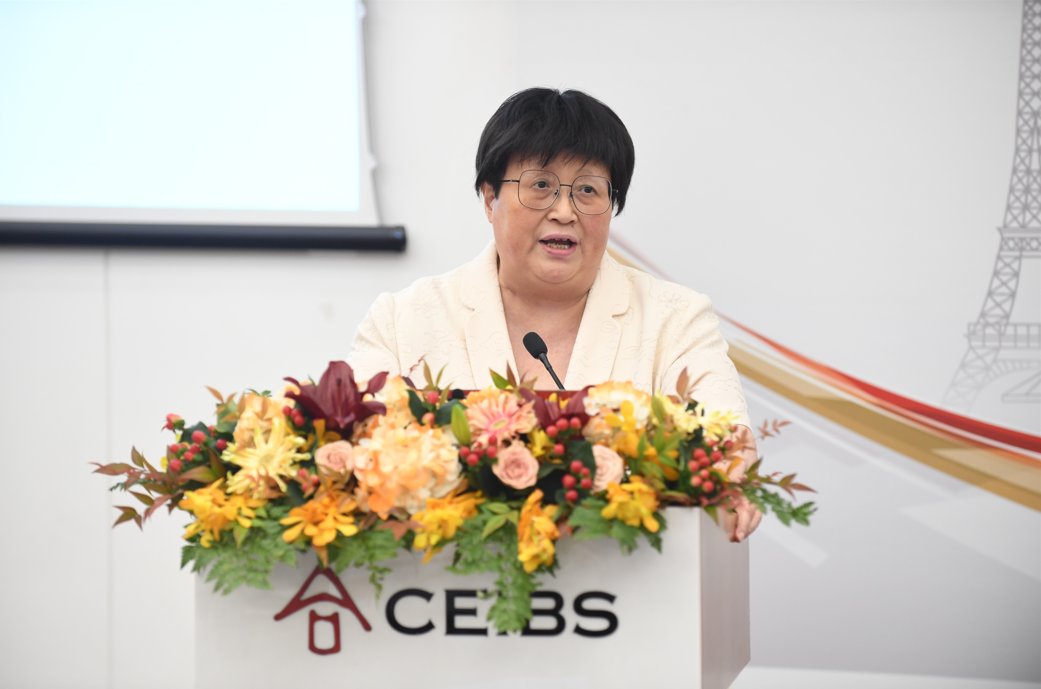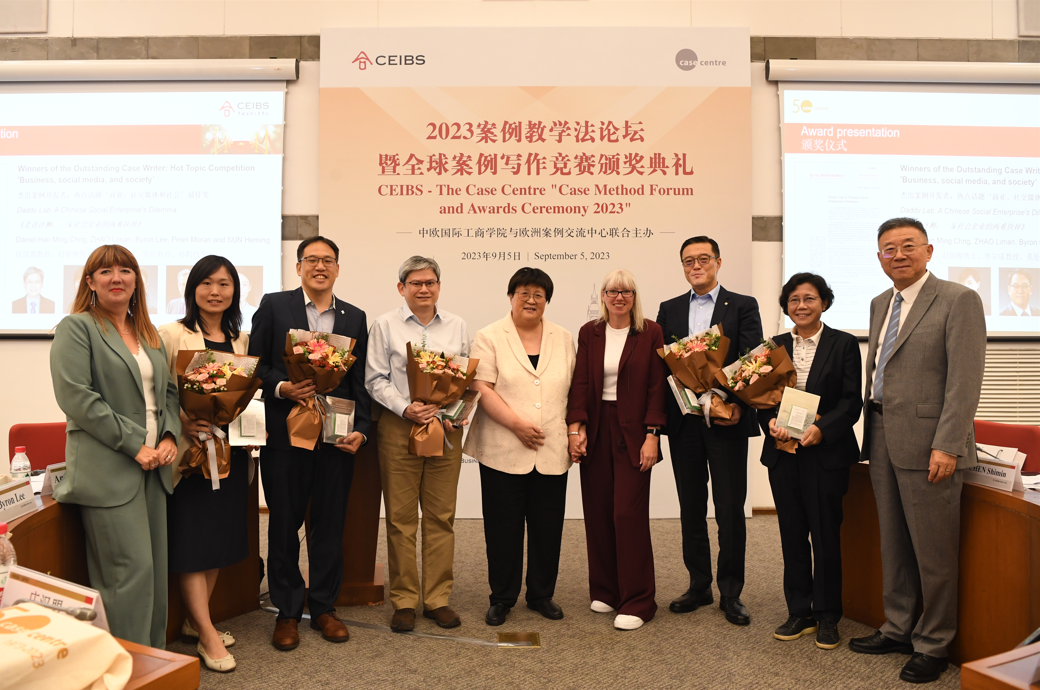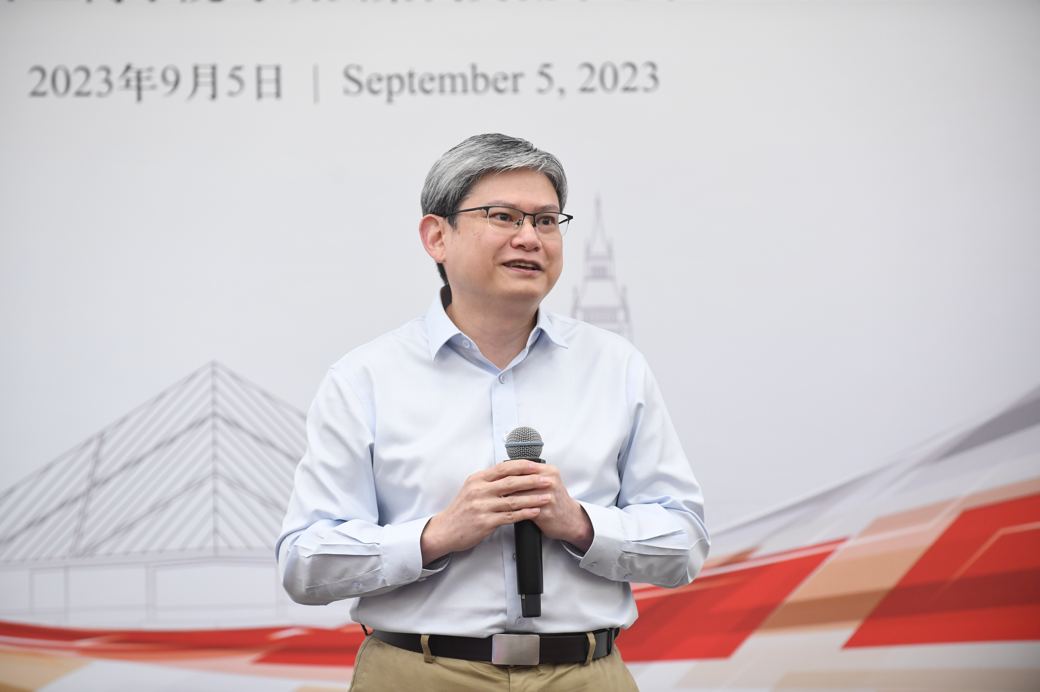An International Perspective on Emerging Trends in Case Development
On September 5, the “Case Method Forum and Awards Ceremony 2023” was co-hosted by CEIBS and The Case Centre at the CEIBS Shanghai Campus. During the event, Vicky Lester, CEO of The Case Centre, awarded trophies to the two CEIBS case-writing teams that were named winners of The Case Centre Awards and Competitions 2023. She also engaged in a lively discussion on emerging trends in case development and teaching in business schools with nearly one hundred guests in attendance, including leaders and faculty members from more than 40 colleges across the country.
CEIBS President Prof. Wang Hong delivered a welcome address, followed by a keynote speech by Ms. Lester. The event was moderated by Chen Shimin, CEIBS Professor of Accounting, Zhu Xiaoming Chair in Accounting, and Director of the CEIBS Case Center.
President Wang noted in her address that since its inception in 2001, the CEIBS Case Center, with its mission of “focusing on management issues in the Chinese business context, adhering to international standards, and supporting classroom teaching,” has been committed to developing cases on distinctive Chinese business practices. Since 2013, it has been tasked with building the “Shanghai MBA Case Development and Sharing Platform.” In parallel, the CEIBS Case Center operates the Global Platform of China Cases (ChinaCases.Org), with the goal of building the world’s most influential China-focused case library and sharing Chinese management solutions globally. As of September 2023, ChinaCases.Org boasts a collection of more than 2,700 cases and has provided case access to more than 6,000 faculty members from 80 colleges and institutions across China, with 880,000 case copies used.

The CEIBS Case Center has also forged partnerships with world-renowned case publishers including The Case Centre, Harvard Business School, and Ivey Business School. CEIBS cases have found their way into the classrooms of business schools in more than 60 countries and regions around the world.
President Wang emphasized CEIBS’ commitment to delving into classic cases, focusing on trending and forward-looking topics in the field of management education that have not yet captured widespread attention or been widely discussed, and breaking new ground in case development and teaching models.
Ms. Lester then presented trophies to the two winning CEIBS teams: the teaching case “Wuling Hongguang MINIEV: A New Breed of Chinese Automaker”, co-developed by CEIBS Professor of Marketing Wang Gao, and Senior Case Researcher Zhu Qiong, won the Outstanding Case Writer Competition, while the teaching case “Daddy Lab: A Chinese Social Enterprise’s Dilemma”, co-developed by CEIBS Professor of Strategy and Entrepreneurship Daniel Han Ming Chng, Senior Case Researcher Dr. Zhao Liman, CEIBS Associate Professor of Management Byron Lee, Prof. Peter Moran, and Research Assistant Sun Heming, won the Outstanding Case Writer: Hot Topic Competition ‘Business, Social Media, and Society’ award.

Representing the winners, Prof. Wang and Prof. Chng delivered their acceptance speeches and shared their experience in case development and teaching. Prof. Wang emphasized the importance of research in case writing. He noted that, “[Before writing], it’s crucial to draw up a teaching plan, not just a writing plan. This involves an assessment of whether the topic and the company featured in the case we intend to write are unique and have the potential to provide valuable lessons to students through case studies.”
Prof. Chng highlighted the importance of teaching-centered case writing. He noted, “You must keep asking yourself why I’m writing this case, what I hope to get across with this case, and what my teaching goals are.”

Following the awards ceremony, Ms. Lester gave a keynote speech titled “The Case Method: Past, Present, and Future”, in which she elaborated on the inception, evolution, and outlook of the case method in business schools.
Since Harvard Business School introduced the case method in the 1920s, case writing has evolved significantly in terms of case format, length, and topics of concern. What has remained constant, however, is the case method, which revolves around problem-solving and decision-making, active student engagement, experiential learning, and the integration of theory and practice. In recent years, case development has taken a new turn as students show a heightened interest in local contexts, diverse protagonists, and hot topics. In addition, case teaching is undergoing transformation, with many business schools embracing a hybrid (O2O) teaching model. During her presentation, Ms. Lester shared the findings of a questionnaire-based survey on the future of the case method. She believes that the case method is here to stay, but educators expect to teach cases using a variety of delivery modes, the topics that cases explore must continue to evolve to reflect the changing workplace landscape, and cases must provide the opportunity for students to expand their digital and technical proficiencies.
Finally, Prof. Lee moderated a roundtable forum on the theme of “What Makes Outstanding Cases: International Case Publishers’ Perspectives”, featuring Prof. Chen and Ms. Lester as guest speakers. The international trio of case method experts discussed the key issues of case writing and teaching, which are of particular concern to business school faculty.
Ms. Lester highlighted three attributes that must apply to make a case stand out as excellent - they must be engaging, decision-oriented, and relevant. Prof. Lee then initiated a discussion on the criteria for high-quality case teaching. According to Prof. Chen, an excellent case teacher should be able to fully engage students in decision-making discussions, write or select good cases to accomplish the learning objectives of a particular course, design a teaching plan for pre-class assignments and in-class discussions, and evaluate the teaching effects after class. Ms. Lester agreed, adding that since the target students for each case may have different backgrounds and perspectives, the case teacher needs to lead a student-centered discussion in each case study. Prof. Lee emphasized the need to tailor the teaching notes to students’ needs for each case study.
Ms. Lester then answered questions from attendees about The Case Centre’s criteria for outstanding teaching cases, the evaluation of a case topic for trendiness, and the development of compact cases. Prof. Chen explained the similarities and differences between the East and the West in case teaching.
Co-organized by CEIBS and The Case Centre, the Forum proved to be a highly successful collaboration between two case publishers from East and West. Attendees all agreed that the century-old case method will continue to move with the times and evolve in different ways while maintaining its effectiveness in teaching.
As one of the world’s largest teaching case platforms for business schools, The Case Centre has long been committed to promoting the development of case writing and teaching, and has made significant contributions to the development, promotion, use, and innovation of teaching cases around the world. This year, The Case Centre celebrates its 50th anniversary. Since 1996, CEIBS has partnered with The Case Centre as a member organization. CEIBS has since consistently embarked on dedicated international engagement in the field of teaching cases, eventually producing the first set of teaching cases in the Chinese mainland to meet international standards.












